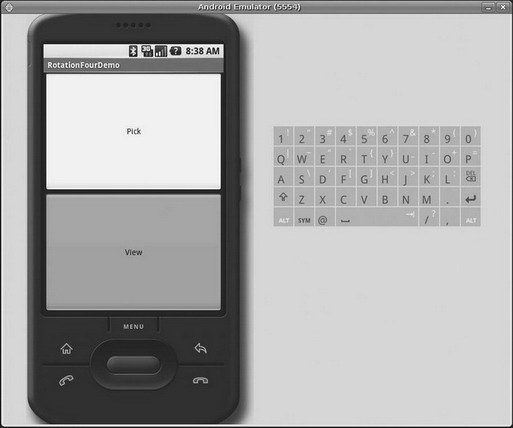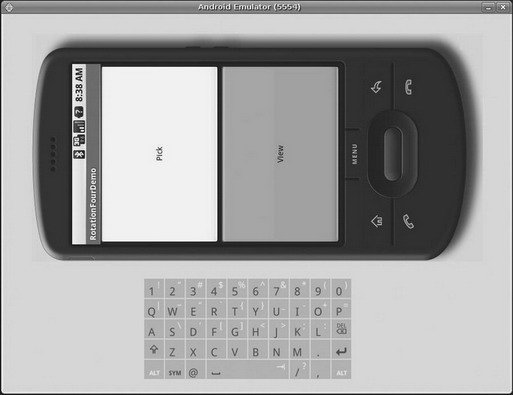Книга: Beginning Android
Forcing the Issue
Forcing the Issue
In the previous three sections, we covered ways to deal with rotational events. There is, of course, a radical alternative: tell Android not to rotate your activity at all. If the activity does not rotate, you do not have to worry about writing code to deal with rotations.
To block Android from rotating your activity, all you need to do is add android:screenOrientation="portrait" (or "landscape", as you prefer) to your AndroidManifest.xml file, as shown (from the Rotation/RotationFour sample project):
<?xml version="1.0" encoding="utf-8"?>
<manifest xmlns:android="http://schemas.android.com/apk/res/android"
package="com.commonsware.android.rotation.four"
android:versionCode="1"
android:versionName="1.0.0">
<application android:label="@string/app_name">
<activity android:name=".RotationFourDemo"
android:screenOrientation="portrait"
android:label="@string/app_name">
<intent-filter>
<action android:name="android.intent.action.MAIN" />
<category android:name="android.intent.category.LAUNCHER" />
</intent-filter>
</activity>
</application>
</manifest>
Since this is applied on a per-activity basis, you will need to decide which of your activities may need this turned on.
At this point, your activity is locked into whatever orientation you specified, regardless of what you do. The following screen shots show the same activity as in the previous three sections, but using the previous manifest and with the emulator set for both portrait and landscape orientation. Note that the UI does not move a bit, but remains in portrait mode as can be seen in Figures 26-3 and 26-4.

Figure 26-3. The RotationFour application, in portrait mode

Figure 26-4. The RotationFour application, in landscape mode
- 4.4.4 The Dispatcher
- About the author
- Chapter 7. The state machine
- Appendix E. Other resources and links
- Example NAT machine in theory
- The final stage of our NAT machine
- Compiling the user-land applications
- The conntrack entries
- Untracked connections and the raw table
- Basics of the iptables command
- Other debugging tools
- Setting up user specified chains in the filter table




